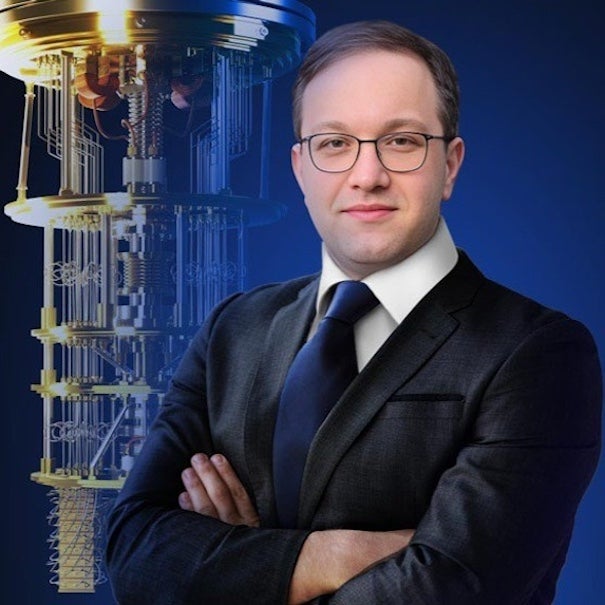Alan Salari wrote the book on quantum hardware
Alan Salari wrote the book on quantum hardware

Alan Salari joined UIC in 2020, arriving with more than a decade of experience developing advanced microwave technologies, including superconducting quantum computers, radar, satellite communication systems, and microwave plasma generators.
Salari earned his bachelor’s degrees in physics and electrical engineering, as well as master’s degrees in physics and electrical engineering, from the University of Bonn and RWTH Aachen University in Germany. He earned his PhD in electrical and computer engineering from UIC this spring.
His resume includes companies such as Microsoft, Axon, Hughes Network Systems, Quantum Circuits, and the Fraunhofer Institute, a German publicly owned research organization that is the largest in Europe. During his career, he has developed products, including one of the first commercial Ku-band phased array terminals for low-earth orbit satellite communications, an integrated microwave control system for superconducting quantum computers, high-power and wideband microwave systems, and microwave cold plasma generators.
When it came to quantum computing, Salari was able to find books on the fundamentals, algorithms, and software implementation, but there were no books on the market that addressed hardware implementation. Only a handful of companies worldwide are working on superconducting quantum computers, and publicly available information on implementing this technology is limited.
“If people want to go to this discipline of developing quantum hardware, they either need to have connections with those companies or access through collaborations with professors or postdocs,” Salari said. “It’s super hard for people to enter this discipline, and workforce development in quantum technologies is an urgent need.”
So Salari wrote a book, the first book on the implementation of superconducting quantum hardware, Microwave Techniques in Superconducting Quantum Computers. It was published last year by Artech House.
“I wanted to compile all the experience I’ve gathered over the years and consolidate key aspects of quantum hardware implementation into a single, comprehensive reference,” Salari said.
Prior to joining UIC’s PhD program, Salari worked with Professor Danilo Erricolo on antenna development and radar satellite communication systems. As a researcher in Erricolo’s Andrew Electromagnetics Laboratory, he is focused on UAV-based ground penetrating radars. The developed airborne radar can detect subsurface objects and identify anomalies in concrete structures, such as bridges, by detecting defects, cracks, and other structural issues.
“It is very unusual for a PhD researcher to write a book,” Erricolo said. “We do not have many PhD researchers that achieve such a milestone.”
The book has been quite successful, reaching the top of Amazon’s bestseller list in numerous categories, including reaching number one in optoelectronics.
Salari hopes his reference helps more people get into quantum and believes engineers from other disciplines, especially microwave engineers, would be a good fit for the field. Industries such as Keysight Technologies, along with universities in the U.S. and Europe, are already using or planning to adopt Salari’s book as a reference for their courses. Institutions such as the University of California San Diego, The Hague University of Applied Sciences in Delft (for their Applied Quantum Technology course), and the University of Milano-Bicocca are among those incorporating his work into their curriculum.
“The difference between quantum computing and radio frequency and microwave engineering is that quantum computing is interdisciplinary,” Salari said. “You need to understand cryogenic techniques, microwave engineering, nanofabrication, quantum mechanics, and quantum computing–and then you need to have a deep understanding of data acquisition and experiment control.”
Salari’s work at UIC has been supported by the Discovery Partners Institute in Chicago, focusing on hands-on, practical experience that translates directly to the needs of the industry.
Salari hopes to help commercialize the ground-penetrating radar systems he is working on with Erricolo, delivering tangible, real-world benefits to society by enhancing public safety, preventing bridge failures, reducing inspection costs, and minimizing infrastructure downtime.